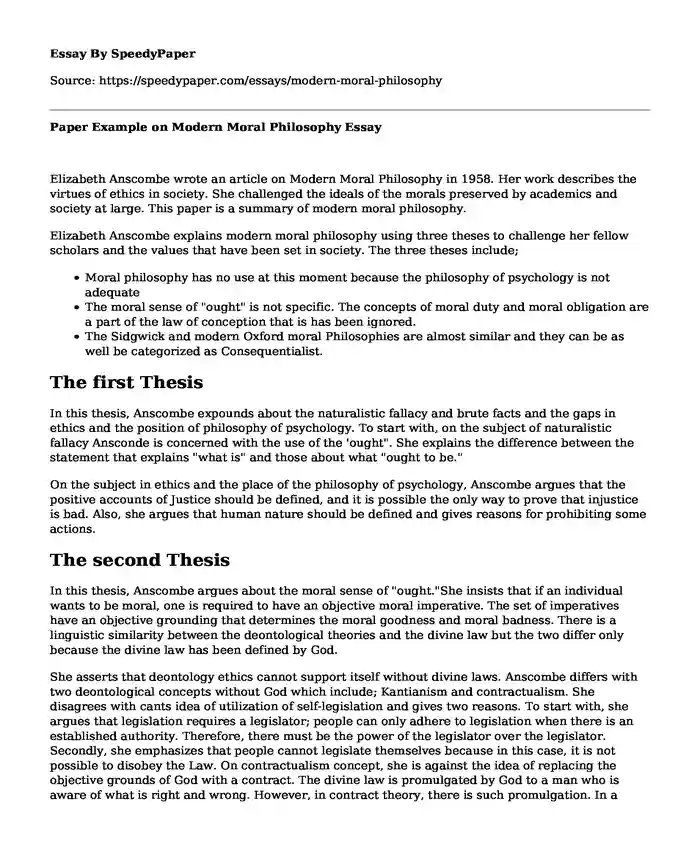
| Type of paper: | Literature review |
| Categories: | Psychology Philosophy Christianity Ethical dilemma |
| Pages: | 3 |
| Wordcount: | 654 words |
Elizabeth Anscombe wrote an article on Modern Moral Philosophy in 1958. Her work describes the virtues of ethics in society. She challenged the ideals of the morals preserved by academics and society at large. This paper is a summary of modern moral philosophy.
Elizabeth Anscombe explains modern moral philosophy using three theses to challenge her fellow scholars and the values that have been set in society. The three theses include;
- Moral philosophy has no use at this moment because the philosophy of psychology is not adequate
- The moral sense of "ought" is not specific. The concepts of moral duty and moral obligation are a part of the law of conception that is has been ignored.
- The Sidgwick and modern Oxford moral Philosophies are almost similar and they can be as well be categorized as Consequentialist.
The first Thesis
In this thesis, Anscombe expounds about the naturalistic fallacy and brute facts and the gaps in ethics and the position of philosophy of psychology. To start with, on the subject of naturalistic fallacy Ansconde is concerned with the use of the 'ought". She explains the difference between the statement that explains "what is" and those about what "ought to be."
On the subject in ethics and the place of the philosophy of psychology, Anscombe argues that the positive accounts of Justice should be defined, and it is possible the only way to prove that injustice is bad. Also, she argues that human nature should be defined and gives reasons for prohibiting some actions.
The second Thesis
In this thesis, Anscombe argues about the moral sense of "ought."She insists that if an individual wants to be moral, one is required to have an objective moral imperative. The set of imperatives have an objective grounding that determines the moral goodness and moral badness. There is a linguistic similarity between the deontological theories and the divine law but the two differ only because the divine law has been defined by God.
She asserts that deontology ethics cannot support itself without divine laws. Anscombe differs with two deontological concepts without God which include; Kantianism and contractualism. She disagrees with cants idea of utilization of self-legislation and gives two reasons. To start with, she argues that legislation requires a legislator; people can only adhere to legislation when there is an established authority. Therefore, there must be the power of the legislator over the legislator. Secondly, she emphasizes that people cannot legislate themselves because in this case, it is not possible to disobey the Law. On contractualism concept, she is against the idea of replacing the objective grounds of God with a contract. The divine law is promulgated by God to a man who is aware of what is right and wrong. However, in contract theory, there is such promulgation. In a contract, all parties must know the contract for it to the binding.
Anscombe provides some possibility of the ability of some existing norms to replace the objective ground of God. Anscombe explores the norm of society and argues that its objective grounding is not suitable for a system of ethics. She perceives that the norms of man have some requisite grounding but they cannot make sense if laws overlook the divine laws that help to define morality.
The third Thesis
On this thesis, Anscombe attack the idea of contractualism. She argues that consequentialism and Christian ethic cannot reconcile. This is because the contract theory provides a room to commit some acts such as murder, torture and conviction of innocent, t which are against the Christian Ethics.
Moreover, Anscombe explores the difference between consequentialism and utilitarianism. Mill in his utilitarianism theory argues that the based on some of its principles some acts may be prohibited despite that they produce good results. Anscombe is against the idea of contractualism because it does not define have defined principles that restrict individuals to act.
References
Anscombe, G. E. M. (1958). Modern moral philosophy. Philosophy, 33(124), 1-19.
Cite this page
Paper Example on Modern Moral Philosophy. (2023, Feb 15). Retrieved from https://speedypaper.com/essays/modern-moral-philosophy
Request Removal
If you are the original author of this essay and no longer wish to have it published on the SpeedyPaper website, please click below to request its removal:
- Essay Sample on NextGen Program
- Free Essay on the Paul Revere's House and Its Artifacts
- Essay Example on Cyber Terrorism: The American Response
- Free Essay Samples on Antidrug Solutions
- Essay Sample: Improving Patient Management through Better Communication between Health Care Providers
- Research Proposal Paper Sample on Human Organs Trafficking
- "Behind Closed Doors" by B.A. Paris: An Exploration of Fear and Courage - Paper Example
Popular categories




